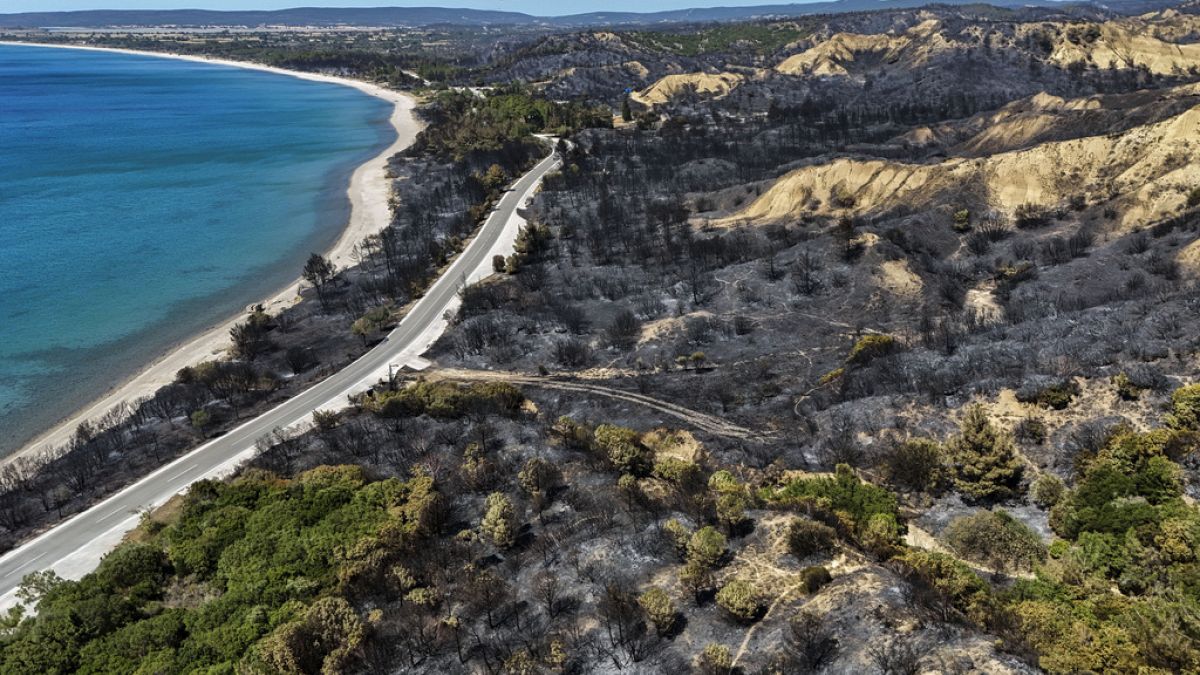Wildfires have been raging across western Turkey for the fourth consecutive day, fueled by strong winds and high temperatures. More than 130 fires have erupted in the past week, with eight major blazes still burning. Thousands of firefighters are working to contain the fires on land and from the air, with additional support from aircraft and vehicles. While thousands of people have been evacuated, fortunately, there have been no reported casualties. Low humidity, high winds, and warm temperatures have been cited as factors contributing to the spread of the fires. The General Directorate of Forestry has warned people not to light fires outdoors due to the increased risk of wildfires.
The fires in Turkey have caused significant damage, including threatening World War I memorials and graves at the Gallipoli battle site. Firefighters managed to extinguish a blaze in Canakkale province that posed a risk to the memorial site. Images showed scorched gravestones at Canterbury Cemetery, where soldiers from New Zealand are buried. Authorities in Bolu have detained four people in connection with the fires, with two individuals being arrested. In June, a fire in southeast Turkey resulted in the deaths of 11 people and numerous others requiring medical treatment.
In addition to the wildfires in Turkey, Portugal is also facing challenges with a fire on Madeira island. A special force of 80 firefighters has been dispatched to the Autonomous Region of Madeira to combat the ongoing blaze. The fire, which started in Serra de Água, has led to the evacuation of residents in nearby areas. The Regional Government is coordinating efforts to provide support to affected families, including clinical, social, and psychological assistance. A total of 54 operatives, 18 vehicles, and a helicopter from the Regional Civil Protection Service of Madeira are actively working to contain the fire, with additional support from other agencies.
It is imperative that adequate resources and personnel are available to effectively combat the wildfires in both Turkey and Portugal. The strong winds, high temperatures, and dry conditions are creating a challenging environment for firefighters and emergency responders. Cooperation between different agencies and timely evacuations are crucial in ensuring the safety of residents and preventing further damage to properties and historical sites. The ongoing fires serve as a reminder of the importance of wildfire prevention measures and the need for swift and coordinated responses to such emergencies.
The impact of wildfires goes beyond environmental damage, with historical sites and memorials also at risk of destruction. The recent fires near the Gallipoli battle site highlight the vulnerability of such cultural landmarks to natural disasters. Efforts to safeguard these sites during wildfire incidents are crucial to preserving the historical significance and memory of past events. The dedication and bravery of firefighters and emergency personnel in protecting these sites and communities are commendable and essential in mitigating the impact of wildfires.
As the wildfires in Turkey and Portugal continue to burn, international support and solidarity are key in addressing the challenges posed by these disasters. The mobilization of resources, equipment, and trained personnel from different countries can enhance the firefighting efforts and help contain the spread of fires. Additionally, awareness campaigns on fire safety and prevention, as well as community engagement, are essential in building resilience and preparedness for future wildfire events. By working together and sharing expertise, countries can improve their capacity to respond effectively to natural disasters and protect lives, properties, and historical sites from the devastating impact of wildfires.










